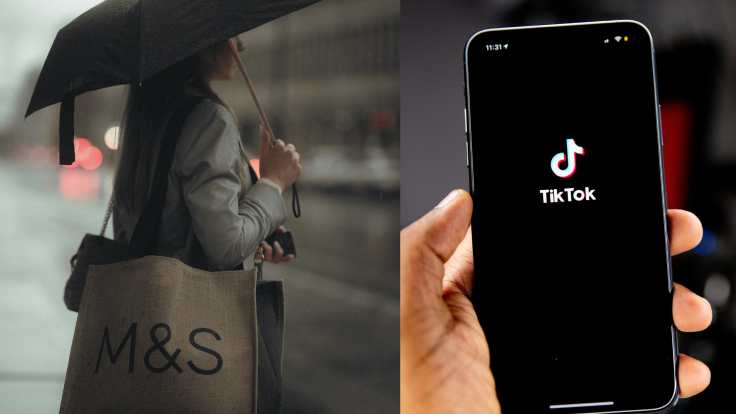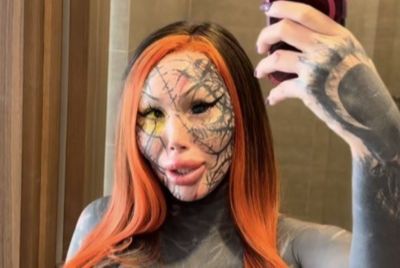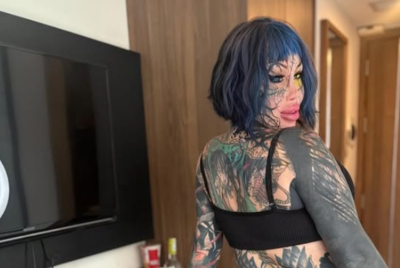M&S Advert Banned For Promoting Unrealistic Body Standards Amid 'SkinyTok' Trend And Declining Body Positivity
The body positivity movement of the 2010s seems to be phasing out as trends like 'SkinnyTok' bring unrealistic body standards back into mainstream fashion

The unhealthy skinny beauty standard that ruled the '90s and early 2000s has been slowly regaining popularity, with a recent M&S advert proving the trend is making a comeback.
The Marks and Spencer advertisement was banned by the Advertising Standards Authority (ASA) due to the model in it appearing 'unhealthily thin.'
The image appeared on M&S's app, showing a woman wearing a cropped white shirt, slim-fitting trousers, and 'large pointed shoes which emphasised the slenderness of her legs.'
'The model's shoulders and the very top of her chest were shown and her collar bones were also very prominent, emphasised by her left hand being in her pocket and being arched outwards,' the ASA said, concluding that the ad was irresponsible.
M&S has since withdrawn the advertisement, claiming they take body image concerns related to their ads very seriously. They said that their women's clothing was inclusive and ranged from size 8 to 24, with the model in the ad being on the smaller end of size 8.
While the 2010s were an era of promoting body positivity and defying the unrealistic beauty standards of the 90s and early 2000s, social media trends like 'SkinnyTok' seem to be bringing the unhealthily thin body type back into mainstream fashion.
What Is 'SkinnyTok'?
The once-celebrated body positivity movement has been replaced by an influx of content on weight-loss drugs and the return of extreme diet culture, found under the hashtag 'SkinnyTok.'
The TikTok trend sees users promoting unhealthy lifestyle choices under the guise of healthy eating and wellness.
Workout routines, 'what I eat in a day' videos, low-calorie recipes and transformation videos are prominent under #SkinnyTok.
The US-based National Alliance For Eating Disorders (NAFED) reported over half a million posts were associated with the hashtag.
'Behind the recipes and workouts is another message: your worth is tied to your weight, and thin is best,' the organisation said.
They claimed 'SkinnyTok' content includes:
- Pressure to over-exercise or restrict intake.
- Shame around eating certain foods or eating 'too much.'
- Messaging that implies your value increases the smaller you become.
- Glorification of disordered behaviors like fasting, skipping meals, or extreme restriction.
- Phrases like 'everything gets better when you're skinny.'
While the hashtag has since been banned by TikTok, 'SkinnyTok' content remains prominent on the app.
As an example of 'SkinnyTok,' one video with over 570,000 views showed the creator showing off her thin side profile while drinking from a mug.
'Drinking tea instead of a snack because I'm not a dog,' the text on the screen read.
Many of the top comments were some form of 'commenting to stay on SkinnyTok.'
Unrealistic Body Ideals Are A Slippery Slope To EDs
NAFED have drawn parallels between 'SkinnyTok' and pro-ana (pro-anorexia) sites that circulated the internet in the early 2000s, promoting eating disorders (EDs) as lifestyles rather than a serious mental illness.
On 'SkinnyTok,' fitness communities can quickly turn into body-shaming echo chambers. 'Clean eating' advice can trigger abusive food rituals.
Eating disorders are heavily impacted by environmental factors, making content like that on SkinnyTok, which is a click of a button away, incredibly dangerous.
Moreover, a 2024 study found that TikTok algorithms for users with EDs contained 4343 per cent more toxic ED videos.
NAFED recommends users avoid SkinnyTok-type content by scrolling quickly past it if it shows up on their feed since the algorithm rewards time and interaction. Additionally, users can press the 'non-interested' feature on the video by long-pressing the screen.
They also recommend talking about the content with a loved one, therapist or support group for those who feel triggered.
© Copyright IBTimes 2025. All rights reserved.






















